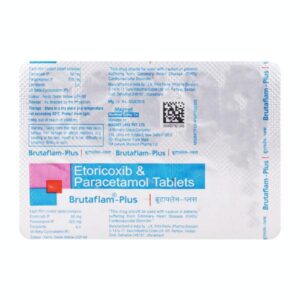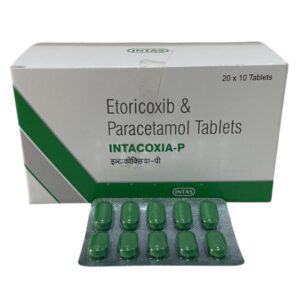PARACETAMOL (ACETAMENOPHEN) + ETORICOXIB
Paracetamol (acetamenophen): Paracetamol, also known as acetaminophen, is a commonly used over-the-counter medication for pain relief and fever reduction. It belongs to the class of analgesic (painkiller) and antipyretic (fever-reducing) drugs. Paracetamol is available in various forms such as tablets, capsules, syrup, and as an ingredient in some combination medications.
Use:
Paracetamol is used to alleviate mild to moderate pain, including headaches, toothaches, muscle aches, and menstrual cramps. It can also help reduce fever associated with various illnesses like the common cold or flu. Paracetamol is safe for use in adults, children, and infants.
Mechanism of Action:
The exact mechanism of action of paracetamol is not fully understood. It is believed to work by inhibiting the synthesis of certain chemical messengers (prostaglandins) in the brain that are responsible for pain and fever. Unlike nonsteroidal anti-inflammatory drugs (NSAIDs), paracetamol has minimal anti-inflammatory effects.
Dose:
The recommended dose of paracetamol depends on the age and weight of the individual. For adults, the usual dose is 500mg to 1000mg, taken every 4 to 6 hours, up to a maximum of 4000mg in 24 hours. For children and infants, the dose is based on their weight and usually given as a liquid suspension.
Side Effects:
Paracetamol is generally considered safe when used as directed. However, it can cause rare side effects such as an allergic reaction, skin rash, or liver damage when taken in high doses or with alcohol. Liver damage is more likely when paracetamol is taken in excessive amounts or for prolonged periods. It is important to follow the recommended dosages and to avoid combining multiple medications that contain paracetamol, as this can increase the risk of overdose. It is advisable to consult a healthcare professional if you experience any side effects or have concerns about the appropriate use of paracetamol.
Etoricoxib: Etoricoxib is a nonsteroidal anti-inflammatory drug (NSAID) that belongs to the class of selective cyclooxygenase-2 (COX-2) inhibitors. It is used for the treatment of pain and inflammation associated with conditions such as osteoarthritis, rheumatoid arthritis, gout, and ankylosing spondylitis.
The primary mechanism of action of Etoricoxib is its selective inhibition of the COX-2 enzyme, which is responsible for the production of inflammatory mediators called prostaglandins. By inhibiting COX-2, Etoricoxib helps reduce inflammation, swelling, and pain.
The dose of Etoricoxib may vary depending on the specific condition being treated. For osteoarthritis and rheumatoid arthritis, the recommended dose is usually 60 mg once daily. For ankylosing spondylitis, the recommended dose is 90 mg once daily. It is important to follow the dosage instructions provided by the healthcare professional.
As with any medication, Etoricoxib may cause certain side effects. Common side effects may include gastrointestinal disturbances such as stomach pain, diarrhea, indigestion, and nausea. Other potential side effects include headache, dizziness, peripheral edema (swelling of the limbs), high blood pressure, and increased risk of cardiovascular events (heart attack or stroke).
It is worth noting that Etoricoxib carries a black box warning in some countries due to the potential increased risk of cardiovascular events, especially when taken at higher doses or for prolonged periods. It is important to discuss the potential risks and benefits with a healthcare professional before starting Etoricoxib.
Overall, Etoricoxib is a medication that is used for the treatment of pain and inflammation associated with various conditions. It is important to use it as directed, be aware of the potential side effects, and monitor for any signs of adverse reactions while taking this medication.


